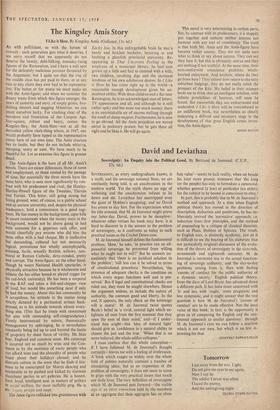David and Leviathan
Sovereignty: An 27s. 6d.)
Enquiry into the Political Good. By Bertrand de Jouvenal. (C.U.P.,
SOVEREIGNTY, as every undergraduate knows, is a myth: and the sovereign national State, we are constantly being told, is an anachronism in the modern world. Yet the myth shows no sign of withering and the anachronism refuses to lie down and die. Leviathan has outstripped even the giant of Hobbes's imagining; and no David has arisen to slay him. For the expectation which his title aroused, that M. de Jouvenal might prove our latter-day David, proves to be deceptive : whatever other virtues 'his book may have, it is hard to discover in it the answer to the problem of sovereignty, as it confronts us today in such practical issues as the Crichel Down case.
M. de Jouvenal himself defines the fundamental problem. 'How,' he asks, 'in practice can an all- powerful sovereign be prevented from willing what he ought not to will?' But he answers im- mediately that 'there is no juridical solution to the problem'; 'still less can it be solved in terms of constitutional procedure.' Nevertheless, `the presence of adequate checks is the condition on which every organ functions well and is pre- served.' But if legal and constitutional checks are ruled out, they must be sought elsewhere. Hence the argument widens, to include the nature of authority, the common good and liberty. In the end, it appears, the only check on the sovereign will is moral : M. de Jouvenal twice quotes Bayle's belief in 'a vivid, natural light which en- lightens all men from the first moment that they open the eyes of their mind,' and—if I under- stand him aright—this 'idea of natural light' should give us 'confidence in a natural ability to choose the just and the true.' 'When that is no more believed, the whole edifice collapses.'
I must confess that this whole conception— if I have followed M. de Jouvenal's thought correctly—leaves me with a feeling of irrelevance. A book which ranges so widely over the whole field of politics naturally contains a number of stimulating ideas; but as an exposition of the problem of sovereignty, it does not seem to come to grips with the very practical issues that touch our daily lives. The very definition of sovereignty which M. de Jouvenal puts forward—`the visible sign of an inner conviction held by the members of an aggregate that their aggregate has an abso- lute value'—seems to lack reality, when set beside his later more prosaic statement that The king (or the people) has only to formulate a command, whether general (a law) or particular (an order), for the subject to be bound in conscience to obey.'
In part, this is probably due to M. de Jouvenal's method and approach. At a time when English political theory has moved in the direction of description, deduction and positivism, he has de- liberately revived the 'normative' approach, i.e. induction from first principles, and the method of proceeding by a critique of classical theorists, such as Plato, Hobbes or Spinoza. The result, to English ears, is distinctly academic, just as it is difficult to see the bearing of his elaborate (but not particularly original) discussion of the evolu- tion of the theory of sovereignty in the sixteenth, seventeenth and eighteenth centuries. M. de Jouvenal is interested less in the actual function- ing of sovereign authority, and the day-to-day problems arising from it, than with finding `canons of conduct for the public authority of a dynamic society.' English political theory, from the days of Lord Bryce, has advanced down a. different path. [tins been more concerned with `is' and less with 'ought,' more pragmatic and less systematic, and it might answer that the real question is how M. de Jouvenal's `canons of conduct' are to be made effective. Not the least value of this bobk, in fact, is the opportunity it gives us of comparing the English and the con- tinental approach to similar questions : through M. de Jouvenal's eyes we can follow a reaction which is not our own, but which is no less in- teresting for that.
GEOFFREY BARRACLOUGH






























 Previous page
Previous page